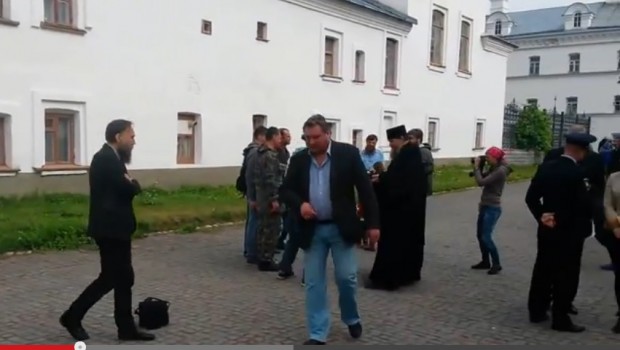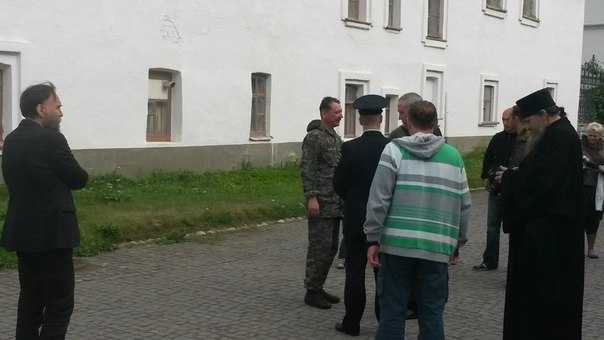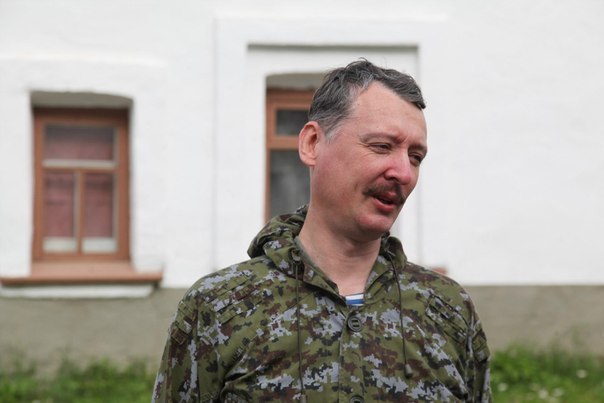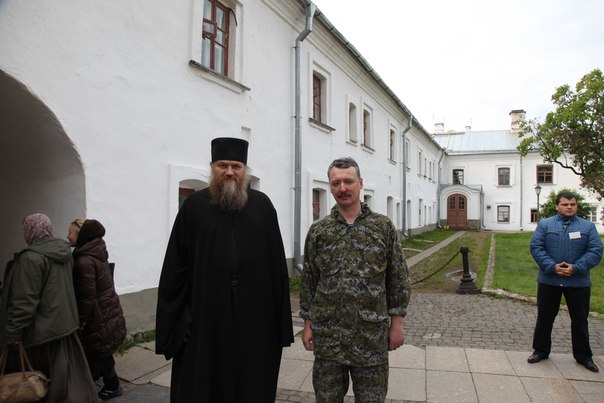On 14 August, the popular and enigmatic Col. Igor Strelkov resigned from his position of “Defense Minister” and “Commander of the Donetsk People’s Republic Militia” after reports that he was wounded. He then disappeared for weeks, and was rumored to be in Sevastopol, in a rest home.
When he surfaced yesterday September 11 for a press conference in Moscow, it was actually after a month of carefully-prepared reports about him appeared in Russian-backed separatist press and social media, some quoting him directly, and contrasting with more critical coverage from Westerners.
His supporters were prostrate with grief at his passing from the leadership of battles in the Donbass, but Western journalists obtained new information about his rein of terror as Ukrainian troops liberated Slavyansk and other towns. After Strelkov’s retreat from Slavyansk, Christopher Miller of Mashable and Kyiv Post discovered the colonel had signed execution warrants reportedly carried out against citizens, although their bodies have not yet been discovered in a mass grave opened that has revealed other crimes of the Russian-backed separatists. But when Aleksandr Boroday, the self-declared “prime minister” of the DPR was interviewed by Russia’s independent Novaya Gazeta, he readily admitted that the DPR carried out executions.
Russian state media was terse about Strelkov, but for his fans, Strelkov was following the path of vilification and then purification of other disgraced but misunderstood or unfairly targeted figures in Russia and was being groomed for a future role.
Most of the speculation about Strelkov’s removal focused on his ostensible challenge to the power of President Vladimir Putin himself as the radical leader of an ultranationalist movement — although these accusations weren’t based on Strelkov’s actual statements, but on rancorous debates about him and other leaders among warring factions of ultranationalists in Moscow.
On 18 August, Novorosinform.org, a pro-separatist site, ran a story with the headline “Strelkov Forced to Leave Novorossiya, Blackmailed with Refusal of Offer of Military Aid,” dated 18 August. “Novorossiya” is both the idealized utopia of a restored tsarist-era swathe of territory including parts of Russia, Ukraine and Moldova, and the term used just for Lugansk and Donetsk regions — and whatever else Russia and the separatists might manage to grab before the Russo-Ukrainian war is over. The story seemed to confirm what many believed was the reason for Strelkov’s forced departure:
“A source in the militia leadership has shared information about what was the reason for the supposed voluntary resignation of Strelkov from the post of DPR Defense Minister and his departure from Donetsk. According to our source, Strelkov was forced to do this through blackmailing; if he refused, the militia wouldn’t receive the promised help.
Earlier, unofficial agreements were reached to received large-scale military support for the militia. The chief condition for providing such support (more than 1,000 personnel and more than 100 armored vehicles) was the resignation and departure of Strelkov from Donetsk. If the event that Strelkov refused to leave, the Donetsk People’s Republic and Novorossiya in general would have been under a threat of complete destruction by the Ukrainian punishers.”
This source was coy about saying where that “help” would come from, but it was obviously Russia — reports of more than a thousand Russian Federation personnel and more than 120 vehicles then appeared, with geolocated videos and journalist accounts to back them up.
Intriguingly, this insinuation — that Strelkov’s supposed threat to Putin was literally costing the rebels their Russian military aid — dovetailed with the very charges made at a dramatic press conference held in Donetsk in July by Sergei Kurginyan leader of the leftist ultranationalist “Essence of Time” ultranationalist movement, who denounced Strelkov for fleeing Slavyansk and supposedly leaving weapons behind, and said that he was “disrupting his supply” of aid from Russia because he refused to put to an end rumors that he would challenge Putin for political leadership. At the time, Pavel Gubarev, the “people’s governor” of the DPR, wrangled with Kurginyan and ultimately walked out of the press conference in protest — he said Strelkov was a warrior, not a politician and couldn’t be expected to make these kinds of scripted statements.
In the month Strelkov remained out of view, supportive journalists tried to pry more out of DPR leaders like Gubarev, but he didn’t seem to be personally in touch with Strelkov; some bloggers began to justify his removal by the need to put in “indigenous” forces — Aleksandr Zakharchenko, while Russian-speaking was born in Donetsk, Ukraine and spent his life in the Donbass; other bloggers surmised that while good at leading the charge for some battalions, Strelkov was incapable of long-term management of large army divisions, which would be the next phase for “Novorossiya.”
Then — as if mindful that too much discreditation of Strelkov could harm the whole ‘Novorossiya’ cause itself, so identified with him, on 21 August an official post was made through the VKontakte group “Dispatches from the Novorossiya Militia” — previously named “Strelkov’s Dispatches” whose name was changed after Strelkov himself informed the group that he would no longer be issuing statements through them.
21.08.14 Report from Aleksandr Zakharchenko, DPR Prime Minister
“Former Defense Minister of the Republic Igor Strelkov will take up the creation of a common army of the Donetsk and Lugansk People’s Republics. He fulfilled his assignment in the DPR and has moved to another job. There is Novorossiya, which needs military cadres, coordination of the staffs between the DPR and LPR. We are not reporting where the ex-DPR minister is now located. The man has fought for three months and has the right to a quiet vacation.”
This job description was both vague and daunting — but Strelkov never took it up.
On 30 August, a conference was organized in Yalta by the Russian-backed separatists, Russian ultranationalists including top Putin aide Sergei Glazyev and representatives of far-right European parties.
Strelkov was at the top of the bill, but he did not appear; a political analyst and blogger Anatoly El Murid explained that he was not even informed and his name was only exploited by “opportunists.” El-Murid posted a picture of himself with Strelkov — but it wasn’t clear where or when it was taken.
During this time, a video dated 28 August and uploaded 3 September began to be circulated on VKontakte and various high-traffic bloggers:
It was said to be taken by “a tourist” and showed the famous Church of the Transfiguration in Valaam in the Karelia region of Russia near the Finnish border — Putin’s favorite monastery visited earlier this year to consult with his spiritual mentor. The video showed a procession of a priest and the faithful with an icon of the Mother of God, likely celebrating the Orthodox Feast of the Dormition (14-28 August). As bloggers noted, the video contained all the key Novorossiya players.
As the camera pans around, first the bearded Eurasianist ideologue Aleksandr Dugin is glimpsed in a jacket, then Strelkov in camouflage fatigues, and finally Konstantin Malofeyev, a wealthy Orthodox businessman with a shorter beard and jacket who reportedly bankrolled the “Novorossiya” adventure. Others in their group could not be identified.

Col. Igor Strelkov (Girkin) and Aleksandr Dugin in Varlaam at the Church of the Transfiguration on 28 August 2014.
On 4 September, the video was published on pravdanews.info with stills from the same scene — a close-up of Strelkov and the group which in fact are not in the video.

Col. Igor Strelkov (Girkin) and Aleksandr Dugin in Varlaam at the Church of the Transfiguration on 28 August 2014.
Another site had still more photos not in the video.
Clearly Dugin and Strelkov are in the pictures, but it’s less certain the bearded man with them is Malofeyev, although some are confident it’s him:
Oligarch Malofeyev meeting Strelkov & Dugin more evidence he likely sponsored rebellion in E Ukraine. @KevinRothrock https://t.co/I9TQkP8pce
— Alec Luhn (@ASLuhn) September 10, 2014
Another figure identified is Sergei Rudov, head of the Foundation of Friends of the Monastery of Vatopedia and a member of the presidential public chamber.
Dugin met 'Rebel' leader Strelkov (Rus colonel) + Rus oligarch Malofeev before White nationalist think-tan, Budapest pic.twitter.com/ZWDQLaZVyy
— Mannfred Nyttingnes (@MannfredNikolai) September 11, 2014
On 7 September, a post from Strelkov appeared on the hidden forum of historical re-enactment buffs where he has long been known to participate, and was picked up by the Russian media.
He said he knew nothing about the Yalta conference where he was listed to speak and accused organizers of exploiting his name for PR; he also denied knowing anything about a rally on 13 September where he is supposed to appear. He confirmed that the blogger El-Murid, who had published a picture of him, was indeed in contact with him, and accused those attaking El-Murid of being related to “birds from Surkov’s nest,” a reference to Kremlin aide Vladislav Surkov, who is believed be in a “party of peace” opposing the Novorossiya “party of war” fighters and influencing Putin in a direction unfavorable to the DPR fighters.
Strelkov then added that he wouldn’t answer the lists of questions to him that had appeared online, including why he left Slavyansk, but said he would “later” — and made an obvious reference to Vladimir Antyufeyev, a long time Kremlin intelligence operative in Transdniestria and other regions who was brought to Donetsk in July and given the title “acting commander-in-chief” until Aleksandr Zakharchenko was installed.
“I do not remove responsibility from myself for the situation in Donetsk. I am well information about what is going on there. But now I cannot influence it in any way, unfortunately. For now.
I will continue inevitably to fight for the Fatherland in one form or another. Let my many “well-wishers” (in Russia and in Novorossiya and also in the Ruins [lit. Ruina, a pejorative term for Ukraine used by the DPR based on a pun–The Interpreter] have no illusions in this regard. While I’m alive, they’ll have to not sleep soundly. Moreover, I ‘send a message’ to certain people in Donetsk, as it is customary to say, ‘I’m mad and I have a good memory.’ This particularly concerns a certain middle-aged lover of fine cigars and whiskey who has portrayed himself successfully for 20 years as an “officer and a patriot.” He will understand. Honor and respect — that is now “not about him.” And I also advise all kinds of local mongrels on his lash not to forget that I am still alive and quite capable.”
Finally, Strelkov makes a reference to one of the top controversial opposition journalists, and cites a famous line from Pyotr Stolypin, Tsar Nicholas II’s reformist Prime Minister, who said to revolutionaries in a Duma speech, “You, gentlemen, need great upheavals; we need a great Russia”:
“Yuliya Latynina and Co. should not expect me in their company. I do not and will not have anything in common with them. ‘They need great upheavals…'”
Strelkov concluded that another volume of his stories would be published in late September. (In July, a pornographic work of slash fanfic appeared on Amazon evidently as part of the campaign to discredit him.
Then, just as it seemed as if Strelkov was consigned to the world of Russian tabloids, conspiracy forums and erudite Twitter ridicule, then Igor Druz, his advisor, came forward with a story published at politnavigator titled “Strelkov Returns,” of meeting Strelkov “in one of the regions of Russia”:
“Brief impressions. I recognized our commander. He always cared less about luxury. He is now living in a small room where strict minimalism reins, if not to say ascetism. There is a table, bed, books, computer. That’s it. Groceries — pirozhki [meat pies], sandwiches, tea, etc. — are brought to him from a local store by a certain old friend.”
Druz said the colonel was continuing to work on “projects to help Novorossiya” but that he had been forced to leave “due to force majeure.” He then added a quote that was made the headline of many articles and posts about this meeting:
“Igor Ivanovich said firmly that he will oppose all the unlawful attempts by pro-Western forces to commit a ‘color’ revolution in Russia” and that he would organize a press conference, and that all the ranks of right and left forces have to be mobilized ‘for a common battle with fascism.'”
Druz concluded with an admission of defeat and a caution about attempts by the liberal opposition to co-opt him:
“We all agreed on one thing: no one will manage to ‘dump’ the Novorossiya project; neither the Ukro-fascists or the traitors from Moscow or their Western curators. And thank God. but the main task was not fulfilled, alas: breaking the back of the Kiev junta. Therefor the attempts to rock our political ‘boat’ from the ‘white-rebellion’ rebels will increase. Our task is to oppose this.”
True to his word, Strelkov appeared to give a press conference on 11 September in Moscow.
He quickly read out a prepared statement:
Intriguingly, Strelkov first began talking about the reason why he resigned — referencing the divided DNR leadership, not the split between the DPR and “Lugansk People’s Republic” and the issue of aid:
“The decision taken was justified, enabling on the eve of the offensive the unification of the leadership of the armed forces of the DNR in one hands and avoid many conflicts within the republic and defuse the situation and also to ensure a reliable supply of our units and formations with all that is necessary.”
While Strekov does not specify the aid comes from Russia, strikingly, this appears to confirm the story in novorosinform.org based on the unnamed source within the DPR that also implied the Russians refused to give aid to the rebels if Strelkov didn’t leave. At the time, this story seemed like a mere rumor because in fact, even after Strelkov retreated from Slavyansk and headed to Donetsk, there was a big infusion of Russian assistance.
On July 30, two weeks before Strelkov’s resignation, there was the battle for Shakhtyorsk supported by Russian armor on July 30, with artillery back-up from Russia. That seemed to suggest that the intrigues and denunciations were irrelevant.
But possibly that aid was already in the pipeline, as Kurginyan himself implied at his press conference, and maybe the conditionality regarding Strelkov was then introduced as that convoy arrived; whatever the back story is, Strelkov was then out by mid-August.
As we know from an intercepted conversation released by the Ukrainian Security Service, on 25 July between Aleksandr Boroday (himself later forced to resign) and Aleksandr Chesnakov, a former United Russia party operative still influential in politics, there was unhappiness with the “f**king mad colonel” as Boroday called him. They discussed the problem of disunity among the various figures in the “Donetsk People’s Republic” and “Lugansk People’s Republic” and the problem of different warlords jockeying for position, a situation Boroday dubbed semikommandirshina — “seven commander rule” — a term improvised from the old Russian term semiboyarshina, “seven boyar rule.”
At the end of this conversation. Chesnakov had another urgent assignment for Boroday, as we wrote at the time:
Chesnakov has another order for Boroday — and invokes the name of Archimandrite Tikhon — Putin’s personal father confessor — with whom he is traveling. He urges him to get Strelkov to express his loyalty to Putin and affirm him as the “commander-in-chief” and as a great leader — the seven boyars’ issue — although he can’t directly fulfill his orders because he is in “another country.” He stresses the importance of Strelkov performing this gesture – oddly, just as Kurginyan did in his press conference that caused the Pavel Gubarev and other separatists to walk out. Boroday yesses him as if he is merely there to fulfill Moscow’s command.
Interestingly, Strelkov never performed this request in Donetsk — perhaps another factor in his ouster — yet at the 11 September press conference he more or less acknowledged Putin should not be opposed because it was war-time, calling out the “fifth columnists” around him.
Summarizing the sense created by Strelkov’s remarks, in a piece for Kyiv Post, Christopher Miller said he “threw his support behind Russian President Vladimir Putin, to whom until now he has not professed his loyalty.” And in a piece headlined “The President Must Be Supported” centerkor-ua.org went further, seeming to quote Strelkov directly as saying, “The president must be supported.”
But in fact, as the videotape indicates, Strelkov didn’t actually say those words.
He began by calling his movement “the popular liberation movement of the Russian people of Novorossiya,” and saw it as necessitated because the USSR “was destroyed with foreign assistance in 1991” and the Russian people were “humiliated” through the 1990s.
While he conceded that in April, before the Russian-backed separatists began fighting, “Ukraine had no support of the public or viable army,” he believed now they did. He claimed the Ukrainian government was involved in “neurolinguistic progamming and zombification of the Ukrainian people,” that they were engaged in the “genocide of the Russian people” and that even “veiled threats from Islamist fighters under the control of the US” were used against “Novorossiya” — all bizarre statements without any grounds, but indicative of his state of mind.
Strelkov sees Putin as surrounded by “fifth columnists” or figures undermining Putin and Russia by intrigues with the West for selfish advantage — so for that reason, gets behind Putin.
“They are planning to fight Russia long, and seriously. The West and the fifth column virtually do not conceal their plans to overthrow President Putin and the ensuing complete break-up of Russia, and its agents of influence make every effort to convince the leadership of the country that reconciliation is not only possible but the only necessary.”
The fact that the enemies of Russia are not suited by anything but capitulation is hidden from the public, and I submit, even from the president.”
Due to these intriguers, “all the relatively favorable options for the Russian spring have not been realized” and now Russia faces a growing military threat. Strelkov then calls out the opposition — but he seems to mean not just the “non-system” opposition outside of parliament, but people who opposed Putin from within his administration or his close cronies in business — he refers to their considerable wealth, just as Boroday did:
“The fifth column’s merits in this regard are incomparable. Why did the liberals make such an implacable and possibly even suicidal attack against the president and his course? Why were they so bold as to challenge him and his policy?
There are two fundamental factors here. First, the fifth column also has only one way out and that’s rebellion, clandestine for now, but that’s only for the time being. The revolution from above begun by President Vladimir Vladimirovich Putin leaves them no chance for political survival, and simply departing from the country, earning their estate by back-breaking toil is not allowed them by their foreign masters.
And the second factor is even more obvious. Possessing serious positions of power and significant financial resources, the traitors seriously plan to seize power themselves, and flush with success, go to the next step, and divvy up the remnants of a one-great country and utilize the people settled on it.”
But before they can do that, they have to accomplish several tasks, one of which is to deprive Putin of his mass support, which they can do by dumping the Novorossiya failures on him. Strelkin believes the fifth column would see to it that the war in southeastern Ukraine would remain a bleeding wound that would never reach decisive victory using the “two steps forward, one step backwards” principle. Novorossiya will be blamed “for a million refugees fleeing.” Western sanctions will “take their toll.”
The premise of President Barack Obama and other Western leaders is that if they impose economic sanctions on the oligarchs close to Putin who prop up his regime, they will constitute a kind of lobby who, for selfish interests, will prevail on Putin to pull back on Ukraine for the sake of their own business climate. This idea is based on the fallacious assumption that oligarchs constitute some kind of separate and independent “business lobby” instead of state capitalists completely intertwined with the Kremlin and dependent on Putin for staying in business.
Yet Strelkov sees them, too, as potentially disloyal forces who will intrigue with the West for the sake of their wealth, or cut and run and try to live abroad — except as they wind up on sanctions lists, they can’t do that.
That is why he warns again “a Moscow Maidan with both left and right forces” and why he appears to offer conditional loyalty to Putin:
“We will strictly refrain from any opposition activity, especially destructive activity”. […] We understand we are under conditions of war, and in war, any rebellion in the rear only plays into the hands of the enemy.”
Strelkov warned those who used his name for destructive purposes and said soon he would propose specific public organizations and actions to help Novorossiya and defend Russia
Despite media picking up this tag line, Strelkov did not say “My place is in Russia” — in fact, that phrase was contained in a question from Komsomolskaya Pravda as a way of summarizing Strelkov’s statement. Asked if he would go back to Donetsk, Strelkov said, “If I am mobilized, if I am ordered, I’m prepared to go to any region.”
But he acknowledged he had no plans to participate in elections and said “I do not believe in elections as such — look at who won the elections in Ukraine.”
Contrary to our reports and those of Western journalists, Strelkov claimed, “There were no Russian troops in mid August when I left.” He added:
“I won’t deny that there were volunteers fighting there, the best of the Russian army. I had several officers in my brigade who spent their vacation fighting for Novorossiya. There is no direct information about participation of Russian Federation forces.”
Strelkov acknowledged that the DPR and LPR territories were only partially controlled by “militia” and denounced the peace agreement as “shameful” because it would “lead to the full destruction of Novorossiya” and was a “virtual capitulation.” He believed the Ukrainian military was only using the ceasefire to arrange for an offensive and “is preparing for war with Russia.”
“Without widescale help from Russia, which I repeatedly asked for in my day and now continue to maintain, a final victory against the so-called Western community and Ukraine, for the militia is not possible.”
“Ukraine was, is, and will be part of the Russian world,” he concluded.
But the phony insurgents got that help, massively, and that has forced a Ukrainian retreat and peace talks, and now a ceasefire that has held nearly a week, despite numerous violations. Perhaps Strelkov has been overtaken by events. One of those stories that constantly plague public figures of all kinds in Russia appeared on a tabloid site and was massively linked on social media, claiming that Strelkov had hanged himself in a private home in Rostov Region but then it was discovered that it had originated 10 September before Strelkov gave his 11 September press conference.
What next? Strelkov said he had no immediate plans to return to the Donbass — and clearly he’s been replaced in the DPR leadership and Zakharchenko’s job offer hasn’t been revived. Perhaps he will go back to re-enacting the Battle of Borodino. Clearly, he’s networking with Dugin who has also lost his seat of power at Moscow State University, from which he was fired for extremism, although they still have Malofeyev’s support. Putin may not need them now, but they have been saved for the next battle, which may be on the home front.


